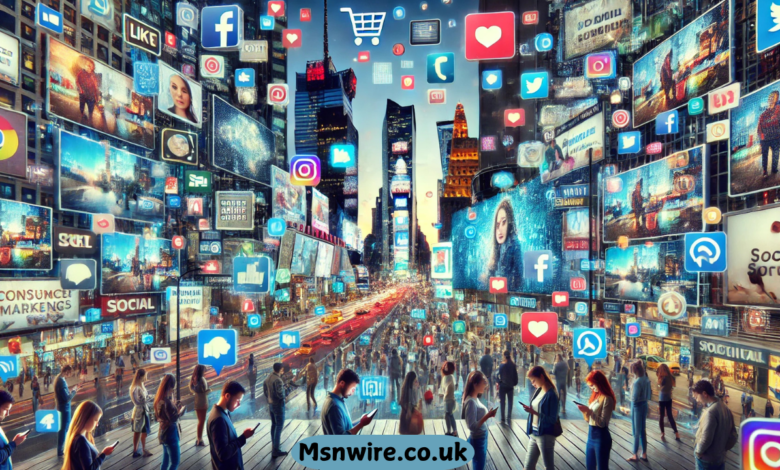The Insidious Proliferation of Modern Marketing: Navigating the Digital Jungle

In today’s interconnected world, marketing has become a powerful force influencing every aspect of our lives. From social media platforms to search algorithms and beyond, advertising has found a way to infiltrate nearly every digital and physical space we occupy. While this proliferation of modern marketing offers significant opportunities for businesses, its ‘insidious’ nature raises ethical, psychological, and privacy concerns. Crafting a well-thought-out business marketing letter can help businesses address these concerns by transparently communicating their values and fostering trust with their audience. In this article, we’ll explore how marketing strategies have evolved, their pervasive effects, and how businesses and consumers can navigate this complex landscape responsibly.
The Evolution of Marketing: From Traditional to Digital
Marketing has endured a significant transformation over the past few decades. Traditional techniques, such as TV commercials and billboards, relied on broad messaging to reach a wide audience. Today, modern marketing harnesses the power of data analytics, artificial intelligence, and behavioral targeting to create hyper-personalized campaigns.
Key Drivers of Marketing Evolution
- Technological Advancements: The advent of the internet and digital tools like AI and machine learning has revolutionized how marketers collect and use consumer data. These tools allow companies to predict consumer behavior and deliver personalized content.
- Social Media Platforms: Instagram, TikTok, and Facebook have become essential marketing channels. They offer direct access to billions of users, enabling real-time engagement and influence.
- Behavioral Targeting: Marketers now track online behaviors, purchase history, and emotions to deliver almost eerily personalized ads.
The Insidious Nature of Modern Marketing
The term “insidious” reflects how seamlessly marketing has integrated into our lives, often without us realizing its presence. Here’s how this proliferation manifests:
Ad Creep: Advertising in Every Space
Advertising has become unavoidable. From sponsored social media posts to ads embedded in video games and even on school buses, marketing has permeated spaces once considered ad-free. This constant exposure contributes to consumer fatigue, reducing the effectiveness of advertising and eroding trust in brands.
Privacy Concerns
The collection of personal data has become a cornerstone of modern marketing. Companies gather information about browsing history, location, and preferences to create targeted campaigns. However, this raises serious concerns:
- Data Exploitation: Many consumers must know how much their data is collected and used.
- Filter Bubbles: Personalized advertising reinforces existing beliefs and biases, limiting exposure to diverse perspectives.
Psychological Manipulation
Modern marketing leverages psychological principles to influence consumer behavior. Techniques such as emotional appeals, fear of missing out (FOMO), and scarcity tactics can manipulate consumers into making impulsive decisions, often leading to buyer’s remorse.
Blurring Lines Between Content and Ads
Native advertising and influencer marketing have blurred the boundaries between genuine content and promotional material. For instance:
- Influencers promote products under the guise of personal recommendations, often without clear disclosure of paid partnerships.
- Sponsored Content appears as editorial articles, deceiving readers into thinking they are consuming unbiased information.
Ethical Dilemmas in Modern Marketing
The proliferation of marketing has sparked numerous ethical concerns. While businesses aim to maximize profits, they must distinguish between effective promotion and consumer exploitation.
Targeting Vulnerable Populations
Children, the elderly, and economically disadvantaged populations are particularly susceptible to manipulative marketing tactics. For example, advertisements in educational environments, such as schools, raise ethical questions about targeting young, impressionable minds.
Deceptive Practices
Deceptive advertising, from exaggerated claims to hidden fees, erodes consumer trust. Despite regulations, many businesses exploit loopholes, prioritizing short-term gains over long-term credibility.
The Role of AI and Automation
Artificial Intelligence (AI) and automation have become integral to modern marketing strategies, enabling businesses to operate at an unprecedented scale. While these tools offer efficiency and precision, they also pose significant risks:
- Loss of Human Touch: Over-reliance on AI can result in impersonal interactions that alienate consumers.
- Opaque Algorithms: AI-driven marketing often relies on black-box algorithms, leaving consumers in the dark about how decisions are made or how data is used.
- 24/7 Marketing Cycle: Automation allows for relentless marketing efforts, which can lead to overconsumption and stress for consumers.
The Consumer’s Perspective: Impact and Resistance
The insidious proliferation of marketing has profound implications for consumers:
- Decision Fatigue: Constant exposure to ads and choices can overwhelm consumers, leading to impulsive decisions.
- Increased Anxiety: Idealized images and messages in advertising often perpetuate unrealistic standards, negatively affecting mental health.
- Consumer Backlash: As awareness grows, many consumers resist invasive marketing practices through ad blockers, privacy settings, and opting out of personalized ads.
Navigating the Marketing Landscape: A Balanced Approach
Both businesses and consumers have roles to play in addressing the challenges posed by modern marketing.
For Businesses
- Adopt Ethical Marketing Practices:
- Be transparent about data collection and usage.
- Avoid manipulative tactics and focus on delivering genuine value.
- Respect Consumer Privacy:
- Obtain explicit consent for data collection.
- Implement robust data protection measures.
- Prioritize Long-Term Relationships:
- Build trust by fostering authenticity and honesty in marketing messages.
For Consumers
- Stay Informed:
- Understand how personal data is collected and used.
- Regularly review privacy settings on digital platforms.
- Use Tools for Protection:
- Install ad blockers and opt out of targeted advertising.
- Limit the sharing of personal information online.
- Practice Mindful Consumption:
- Be aware of marketing influences and make informed purchasing decisions.
The Future of Marketing
As marketing technologies continue to evolve, so will the challenges. Future trends may include:
- Stronger Regulations: Governments may impose stricter privacy laws to protect consumers from invasive practices.
- Innovative Technologies: Emerging tools like augmented reality (AR) and virtual reality (VR) will create new marketing opportunities but also demand ethical consideration.
- Focus on Sustainability: Consumers increasingly expect brands to align with social and environmental values, pushing businesses toward more responsible marketing practices.
Conclusion: Striking a Balance
The insidious proliferation of modern marketing reflects both the power and pitfalls of technological advancements. While it offers businesses unparalleled opportunities to connect with consumers, it also demands greater accountability to ensure ethical practices. By fostering transparency, respecting privacy, and prioritizing consumer well-being, the marketing industry can evolve into a force for good rather than an “insidious” presence.



